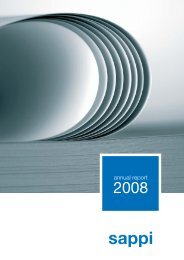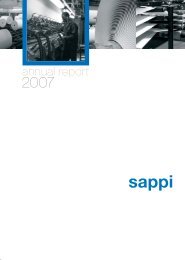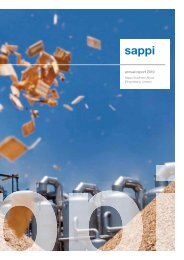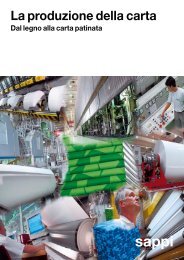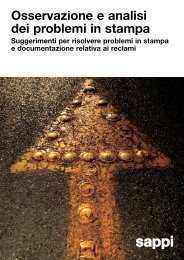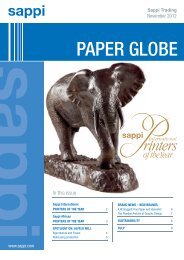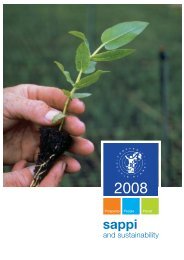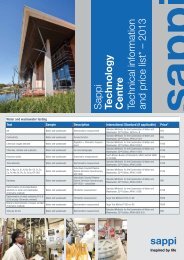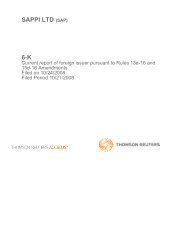2012 Integrated report - Sappi
2012 Integrated report - Sappi
2012 Integrated report - Sappi
You also want an ePaper? Increase the reach of your titles
YUMPU automatically turns print PDFs into web optimized ePapers that Google loves.
Notes to the group annual financial statements<br />
for the year ended September <strong>2012</strong><br />
28. Share-based payments continued<br />
The following table sets forth certain information with respect to the 1,149,600 Share options and Performance shares granted by<br />
<strong>Sappi</strong> to executive directors:<br />
Issue date<br />
Number of<br />
options/shares (1)<br />
Expiry date<br />
Exercise<br />
price (ZAR) (1)<br />
13 December 2004 39,600 13 December <strong>2012</strong> 46.51<br />
22 December 2008 (2) 242,000 22 December <strong>2012</strong> –<br />
09 December 2009 (2) 315,000 09 December 2013 –<br />
03 December 2010 (2) 283,000 03 December 2014 –<br />
02 December 2011 (2) 270,000 02 December 2015 –<br />
(1) Adjusted for the Share options and Performance shares granted as a result of the rights issue.<br />
(2) Performance shares.<br />
1,149,600<br />
Refer to note 35 for more information on directors’ participation in the Scheme and the Plan.<br />
No new loans have been granted to the executive directors since 28 March 2002.<br />
Black Economic Empowerment<br />
In June 2010, <strong>Sappi</strong> completed a Black Economic Empowerment (‘BEE’) transaction (the ‘BEE transaction’) that enabled <strong>Sappi</strong> to meet<br />
its BEE targets in respect of BEE equity ownership. The South African government has through the years promulgated various pieces of<br />
legislation to increase the participation of Historically Disadvantaged South Africans (‘HDSAs’) in the South African economy and, through<br />
BEE legislation, formalised the country’s approach in this regard. <strong>Sappi</strong> views BEE as a key requirement for sustainable growth and social<br />
development in South Africa.<br />
In April 2006, <strong>Sappi</strong> announced a BEE transaction (the ‘Plantation BEE Transaction’) that included a consortium of investors and certain<br />
categories of <strong>Sappi</strong>’s South African employees. However, the Plantation BEE Transaction did not meet <strong>Sappi</strong>’s undertakings under the<br />
Forestry Charter gazetted in June 2009 (which sets the objectives and principles for BBBEE (‘Broad-based Black Economic<br />
Empowerment’) in the forestry industry and includes the BBBEE scorecard and targets to be applied, as well as certain undertakings by<br />
government and South African forestry companies to assist the forestry industry to achieve its BBBEE targets). Accordingly, <strong>Sappi</strong><br />
decided to unwind the Plantation BEE Transaction and to implement the BEE transaction, a new sustainable transaction of equivalent<br />
value using its listed securities.<br />
The BEE transaction has resulted in potentially 4.5% of the issued share capital of <strong>Sappi</strong> being held as follows:<br />
• <strong>Sappi</strong>’s South African Employees (62.5%);<br />
• South African Black Managers (15%);<br />
• Strategic Partners (12.5%) (refer to the section ‘The BEE transaction’ in this note); and<br />
• Communities surrounding the South African mill operations and plantations (10%).<br />
The BEE transaction<br />
The BEE transaction comprised two distinct parts:<br />
• The value created through the Plantation BEE Transaction was settled by the issue of 4.3 million fully paid up ordinary shares at a price<br />
based on the 30 day volume weighted average share price (‘VWAP’) of <strong>Sappi</strong> as at Friday, 05 February 2010 of ZAR33.50.<br />
• The creation and issuance of a new class of unlisted equity shares referred to as ‘A’ ordinary shares. The ‘A’ ordinary shares were<br />
issued at their par value of ZAR1 to a trust formed for the benefit of certain <strong>Sappi</strong> employees including HDSAs (the ‘ESOP Trust’), a<br />
trust formed for the benefit of certain <strong>Sappi</strong> managers that are HDSAs (the ‘MSOP Trust’) and a trust formed for the benefit of<br />
communities surrounding the major mills and/or plantations operated by <strong>Sappi</strong> in South Africa (the ‘<strong>Sappi</strong> Foundation Trust’, and<br />
together with the ESOP Trust and the MSOP Trust, the ‘BEE Trusts’). The issuance of the ‘A’ ordinary shares was financed through<br />
notional non-interest-bearing loans extended by <strong>Sappi</strong> to the BEE Trusts. The BEE transaction resulted in the BEE Trusts and the<br />
Strategic Partners holding, collectively, ordinary and ‘A’ ordinary shares equivalent to 4.5% of the share capital of <strong>Sappi</strong> Limited, which<br />
corresponds to an effective 30% interest in <strong>Sappi</strong>’s South African business under the Forestry Charter and BEE legislation in general.<br />
The number of ordinary shares allocated to the Strategic Partners and <strong>Sappi</strong> employees who were participants of the Plantation<br />
BEE Transaction are as follows:<br />
Entity<br />
Ordinary<br />
share allocation<br />
Strategic Partners:<br />
Lereko Investments (Pty) Limited 1,971,693<br />
Malibongwe Women Development Trust 432,842<br />
AMB Capital Limited 643,221<br />
3,047,756<br />
Employees (through the ESOP Trust) 1,280,597<br />
Total 4,328,353<br />
152



